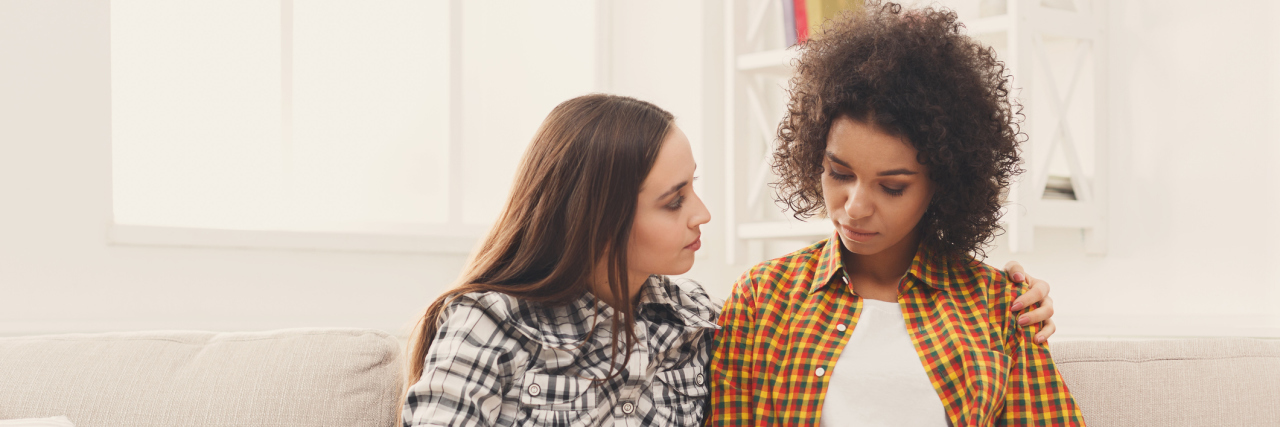Ask anyone living with a mental illness and most will agree with you on this: Talking about your illness isn’t easy. And if you live, in particular, with major depressive disorder (MDD) or a similar illness (like bipolar disorder), I find it’s particularly hard to talk about your disease because your depression can be a chronic liar. It tells you you’re the only person who feels this way, even though 264 million people worldwide live with depression. It tells you it’s your fault for being depressed in the first place, as if you had a choice in the matter. It tells you you’re not good enough or deserving of support and you should just live with this illness in silence. It even tells you you’re not really depressed; you’re just faking it, not trying hard enough or just plain lazy.
So much of the struggling I experienced due to depression was largely out of my control. I certainly wouldn’t have asked to have this illness if I had a choice. But some of my struggle was unnecessary — perhaps, most importantly, the secretive nature in which I hid my depression from the rest of the world, including my closet friends.
Again, I won’t say it’s easy to go up to someone and tell them you are living with a highly stigmatized mental illness. However, it’s just as hard, if not harder, to struggle with your disease in silence. To have a serious, chronic disease that affects you day-to-day and not tell anyone feels like drowning underwater without a lifeguard. You need someone to lift you upstream, support you and remind you you’re not alone.
It wasn’t so much that I didn’t trust my friends to tell them how I felt as I felt a deep sense of shame from having my diseases. Depression told me all the lies listed above and more, making me retreat into myself and separating myself far away from those I cared about. There were many times I desperately wanted to tell people, or just have them look at me and be able to tell I wasn’t OK, despite of what I said. But the courage wasn’t there, and because of that, I stayed quiet for many years.
Not telling my friends about my depression was a mistake. And it was a nearly deadly mistake at that. Self-isolation is all-consuming. It worsens your feelings of self-hatred and cuts you off from the rest of the world. You worry people will think you are “crazy” because you might really believe you are “crazy” yourself. Feeling lonely is never a good feeling. If you don’t reach out, you’ll probably never get help and often, you’ll only sink. Or, in my case, succumb to self-harm and suicidal ideation, and possibly even suicide itself.
But you can stop the cycle. Depression thrives off of isolation, so you should do the exact opposite of that. Physically distancing during a pandemic is not the same as emotionally distancing yourself from people. Call a friend you haven’t seen in a while on the phone. Text someone. Do a video chat with some people. Message one another on social media, send emails, handwritten letters or whatever you can to get into contact with the ones you love. Do what you can to not stay isolated.
You don’t have to tell people everything you’re feeling, but you don’t have to lie, either — especially when you want to tell the truth. It’s OK to not be OK, and it’s OK to tell people you’re not OK. No one is OK all the time, and someone who is your friend will understand that. There’s a chance they’ll understand how you’re feeling themselves, even if they aren’t in the throes of depression like you are.
It’s scary opening up to people. Personally, being vulnerable in any shape or form always makes me feel uncomfortable. But opening up to the right people is worth it — and it saved my life. I don’t know where I would be today if I didn’t have a support system or people who cared about me. Being honest about how I was feeling, and then being able to openly speak about my mental illness was a treatment for depression I didn’t know I needed.
There are a lot of things I wished I had told my friends about depression, but I can’t live in the past. What I will tell my friends now, though, is I have depression and I’m not always OK, and that’s OK. I will tell my friends I love them and appreciate their support, and that nothing will change that — not even my depression.
Getty image by Prostock-Studio

